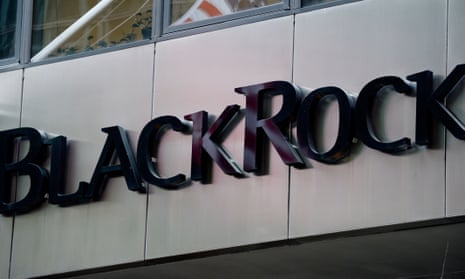The EU did not properly consider conflicts of interest when it hired the US investment manager BlackRock to advise on environmental regulation for banks, an influential watchdog has said.
The European ombudsman, Emily O’Reilly, said the European commission, the EU’s executive arm, should strengthen its conflict of interest rules in light of the findings, in a judgment published on Wednesday.
BlackRock, the world’s largest investor, had $7.8tn (£5.8tn) in assets under management at the end of September. In March, it won a tender from the EU to advise on how to integrate ESG (environmental, social and governance) issues into banking regulation. BlackRock has already carried out much of the work required under the contract.
The contract prompted heavy criticism from campaigners over a potential conflict of interest, given BlackRock’s status as the world’s largest manager of shares in fossil fuel extractors, as well as being a major investor in most of the world’s biggest banks.
The ombudsman said “there is a clear risk that those interests may influence the outcome of its work in its own favour”.
BlackRock, which has recently acted to improve its reputation on environmental issues, was the only large investment manager out of nine bidders.
Members of the European parliament wrote to the commission expressing their concerns and the EU ombudsman announced it would launch an investigation in July after a complaint by two MEPs and Change Finance, a network of non-governmental institutions.
The bid from BlackRock “should have resulted in significantly more critical scrutiny”, O’Reilly said. Her report cleared the commission of maladministration but O’Reilly said this was only because the EU’s conflict of interest rules were too vague to be of use.
“The risk of conflicts of interest when it comes to awarding contracts related to EU policy needs to be considered much more robustly both in EU law and among officials who take these decisions,” O’Reilly said.
The campaigners who brought the complaint said the commission must withdraw the contract.
Kenneth Haar, a campaigner at the Corporate Europe Observatory, a member of Change Finance, said: “Looking at this case, it is hard to come by more glaring conflicts of interest in one go. By choosing BlackRock, the commission basically handed big finance the steering wheel for the implementation phase of its action plan on sustainable finance.”
The ombudsman drew particular attention to an “exceptionally low financial offer” from BlackRock. The investment manager offered €280,000 (£249,000) for the work, although the European commission’s suggested fee was €550,000.
The ombudsman said the low price “could be perceived as an attempt to assert influence over an investment area of relevance to its clients”, although she did not make a judgment as to whether that was the case.
The rebuke by the ombudsman is a blow to Valdis Dombrovskis, the European commission’s powerful executive vice-president, who wrote that the award to BlackRock “followed scrupulously the rules of the Financial Regulation” after concerns were raised.
Rasmus Andresen, a German MEP in the Greens/European Free Alliance, said the commission’s answers on the conflict of interest concerns had not been satisfactory.
“The commission must update its public procurement guidelines and carefully choose its contractors,” he said. “BlackRock was an abnormally low bidder because it wanted to weasel its way into European law-making. For me, this is unacceptable.”
A BlackRock spokesman said: “The European commission has already publicly stated that the technical quality of [BlackRock]’s proposal was the basis for their decision in awarding the mandate. [BlackRock] has taken a wide-ranging and inclusive approach, including academia, civil society, banks, supervisors and market practitioners, and looks forward to completing its work and delivering its final report to the commission.”
A European commission spokesman welcomed the finding that there was no maladministration, saying it showed “we applied the rules fully and fairly”. The spokesman said the “commission is committed to transparency” and that it would respond to the ombudsman’s suggestions and publish BlackRock’s work.
